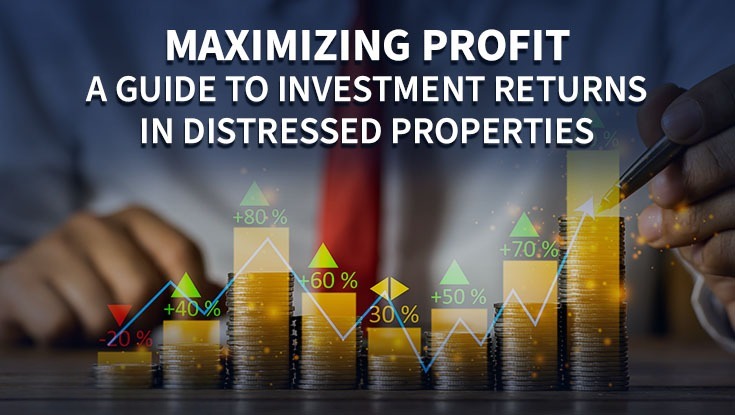Savvy investors look for ways to make more money in real estate. One of the most lucrative is investing in distressed properties, but only if handled well. This guide gives insights and tips on making your investment in this venture successful.
Investing in Distressed Properties: What You Need to Know
These are assets in disrepair or financial instability. These stakes can fall into various categories, including:
- Foreclosures: These are homes taken by lenders because the mortgage was unpaid. Most often, you can buy these properties at lower prices.
- Short Sales: These happen when homes sell for less than what’s owed on their mortgage. It’s a way for owners to avoid foreclosure.
- Bank-Owned (REO) Properties: These are homes that banks have taken back. They’re usually sold cheaper than other homes.
- Fixer-Uppers: These are homes needing a lot of repairs or updates. They offer a chance to buy a home for less and customize it.
Why Invest in These Assets
Investing in distressed properties can be rewarding. Here are some of the reasons why it’s worth looking into:
- Potential for High Returns: One of the primary reasons these assets attract investors is the potential for higher returns on the money they put into them. Buying low and renovating a property to increase its value can result in significant profit margins when selling or renting it out.
- Diversification of Real Estate Portfolio: These stakes can help you achieve this goal. You can stop relying on conventional rental stakes alone. Instead, you can explore alternative options that offer different risk-reward profiles.
- Market Opportunities: Your investment in distressed properties, including distressed multifamily investing, often becomes more prevalent during market fluctuations. This gives investors unique opportunities to get lower-priced properties. It allows them to take advantage of market conditions.
Investing in Distressed Properties: Due Diligence Process
Conduct thorough due diligence before trying any investing opportunities. This process involves:
- Researching the local market to identify potential opportunities
- Inspecting and assessing the condition of the property
- Evaluating the costs associated with repairs and renovations
Due diligence minimizes risks. It also ensures you make informed investing decisions. This prepares you to learn the following strategies to help you succeed:
- Financing Your Stake: Choosing the right financing option is critical when investing. Consider whether a traditional mortgage, a loan, or private funding fits your strategy. Calculate your budget to avoid overextending yourself financially.
- The Art of Negotiation: Negotiating with the owners when investing in distressed properties requires finesse. Understand the seller’s motivation. Therefore, you must use effective negotiation tactics. Aim to secure favorable deals that align with your spending goals.
- Renovation and Improvement: Focus on renovations based on the property’s needs and market demands. Collaborate with experienced contractors and develop a budget. This will ensure cost-effective improvements that boost the asset’s value.
- Property Management: Choose the right property manager. This is crucial for maintaining and maximizing returns on your investment in distressed properties. Implement effective tenant screening processes and ensure regular asset maintenance.
Dealing with Distressed Property Risks
Doing due diligence equips you to understand the following factors. It helps you deal with risks better:
- Legal Considerations: Navigating the legal challenges concerning investing in distressed properties is essential. Learn zoning rules and codes to avoid legal issues that might put your money at risk.
- Mitigating Risks: Learn how to reduce the risks associated with your stakes. These include building a contingency plan and securing appropriate insurance coverage. Also, stay informed about market fluctuations.
- Marketing and Selling: When it’s time to sell or rent your asset, create an effective listing. Ensure to highlight its potential. Attract buyers or tenants with smart marketing and seal the deal on good terms.
- Tax Implications: Understand the tax implications of your financial venture. These include capital gains tax and 1031 exchanges. Leveraging tax benefits can significantly impact your returns.
Investing in Distressed Properties: Frequently Asked Questions
What are some common mistakes to avoid when investing in properties with unpaid mortgages?
Common mistakes include underestimating repair costs and inadequate due diligence. You must also avoid dealing with it if you lack negotiation skills.
How do I find foreclosed assets to invest in?
You can find these stakes through various channels. Mainly, you can search them at real estate listings, auctions, and foreclosure databases. It will also help to do some networking with real estate professionals.
Is investing in distressed properties suitable for first-time investors?
While this fixer-upper properties investment can be profitable, such assets may present more challenges for first-time investors. It’s advisable to gain experience in traditional real estate before venturing into this type of venture.
Is hiring a real estate agent for foreclosed property investments necessary?
While not mandatory, working with a real estate agent can provide valuable insights. They can point you to potential deals. This is helpful, especially for those new to the market.
How long does it take to see a return on my investment in such a stake?
The ROI timeline varies depending on location, property conditions, and market dynamics. It can range from several months to a few years.
What is the best way to estimate renovation costs for a distressed property?
To estimate renovation costs accurately, get quotes from several contractors and add a buffer for unexpected expenses. Also, consider the property’s size and the extent of repairs needed. This approach helps ensure you stay within budget and make profitable decisions.
Conclusion
Investing in distressed properties can be a lucrative venture when approached strategically. Understand the market, conduct thorough due diligence, and execute a well-thought-out plan. This way, you can maximize your profit potential in this niche real estate sector. Start your journey today and unlock the doors to financial success and opportunities.
About StoutCap:
StoutCap focuses on helping accredited investors build passive income and wealth through multifamily real estate investments. As a private real estate investment firm, we work across the United States. Strategically, we acquire and manage multifamily assets in high-growth markets. Our mission is to provide clients with the opportunities and expertise needed to reach financial goals in the dynamic world of real estate investing. Explore the potential of multifamily real estate with us.





